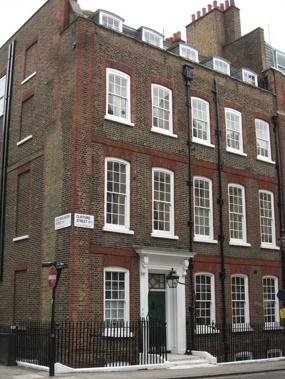
The Drones Club is a recurring fictional location in the stories of British humorist P. G. Wodehouse. It is a gentlemen's club in London. Many of Wodehouse's Jeeves and Blandings Castle stories feature the club or its members.

Uncle Dynamite is a novel by P. G. Wodehouse, first published in the United Kingdom on 22 October 1948 by Herbert Jenkins, London and in the United States on 29 November 1948 by Didier & Co., New York. It features the mischievous Uncle Fred, who had previously appeared in Uncle Fred in the Springtime (1939).
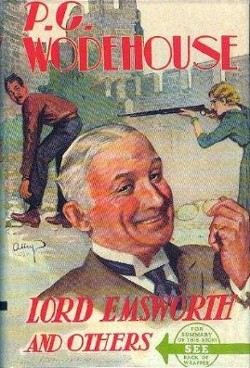
Lord Emsworth and Others is a collection of nine short stories by P. G. Wodehouse, first published in the United Kingdom on 19 March 1937 by Herbert Jenkins, London; it was not published in the United States. The Crime Wave at Blandings, which was published on 25 June 1937 by Doubleday, Doran, New York, is a very different collection, sharing only three of its seven titles with the UK book. Penguin Books published a UK edition of The Crime Wave at Blandings in 1966. The stories in both books had all previously appeared in both British and American magazines.

Plum Pie is a collection of nine short stories by P. G. Wodehouse, first published in the United Kingdom on 22 September 1966 by Barrie & Jenkins, and in the United States on 1 December 1967 by Simon & Schuster, Inc., New York. The collection's title is derived from P. G. Wodehouse's nickname, Plum.

Blandings Castle and Elsewhere is a collection of short stories by P. G. Wodehouse. It was first published in the United Kingdom on 12 April 1935 by Herbert Jenkins, London, and, as Blandings Castle, in the United States on 20 September 1935 by Doubleday Doran, New York. All the stories had previously appeared in Strand Magazine (UK) and all except the last in various US magazines.

Nothing Serious is a collection of ten short stories by P. G. Wodehouse. It was first published in the United Kingdom on 21 July 1950 by Herbert Jenkins, London, and in the United States on 24 May 1951 by Doubleday & Co., New York. It was published again in 2008 by The Overlook Press.
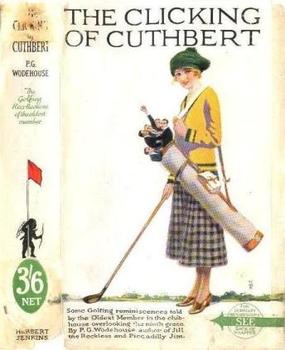
The Clicking of Cuthbert is a collection of ten short stories by P. G. Wodehouse, all with a golfing theme. It was first published in the United Kingdom on 3 February 1922 by Herbert Jenkins Ltd of London. It was later published in the United States by George H. Doran of New York on 28 May 1924 under the title Golf Without Tears. The short stories were originally published in magazines between 1919 and 1922.
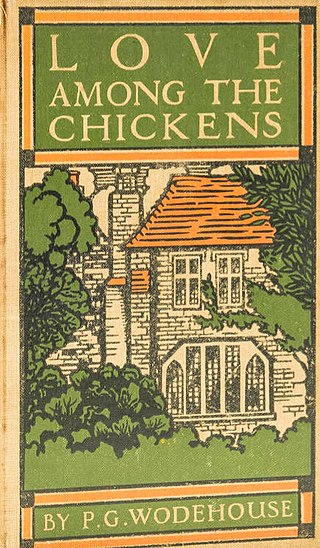
Love Among the Chickens is a novel by P. G. Wodehouse, first published as a book in the United Kingdom in June 1906 by George Newnes, London, and in the United States by Circle Publishing, New York, on 11 May 1909. It had already appeared there as a serial in Circle magazine between September 1908 and March 1909. The English edition was dedicated "to Sir Bargrave and Lady Deane"; the Rt Hon Sir Henry Bargrave Deane QC was a High Court judge and a cousin of Wodehouse's mother.

The Coming of Bill is a novel by P. G. Wodehouse. It was published as Their Mutual Child in the United States on 5 August 1919 by Boni & Liveright, New York, and as The Coming of Bill in the United Kingdom on 1 July 1920 by Herbert Jenkins Ltd, London. The story first appeared in Munsey's Magazine (US) in May 1914 under the title The White Hope.

"Extricating Young Gussie" is a short story by the British comic writer P. G. Wodehouse. It was first published in the United States in the 18 September 1915 issue of The Saturday Evening Post and in the United Kingdom in the January 1916 edition of The Strand Magazine. It was included in the collection The Man with Two Left Feet (1917).

Doctor Sally is a short novel by P. G. Wodehouse, first published in the United Kingdom on 7 April 1932 by Methuen & Co., London. In the United States, it was serialised in Collier's Weekly from 4 July to 1 August 1931 under the title The Medicine Girl, and was included under that name in the US collection The Crime Wave at Blandings (1937).
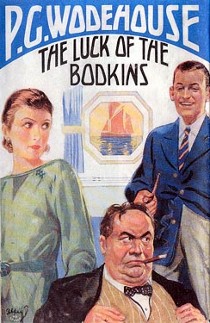
The Luck of the Bodkins is a novel by P. G. Wodehouse, first published in the United Kingdom on 11 October 1935 by Herbert Jenkins, and in the United States on 3 January 1936 by Little, Brown and Company. The two editions are significantly different, though the plot remains the same. The novel was serialised in The Passing Show magazine (UK) from 21 September to 23 November 1935, and this version was published as the UK edition. For its US magazine appearance, in the Red Book between August 1935 and January 1936, Wodehouse re-wrote the story, reducing its length, and this became the US book edition.
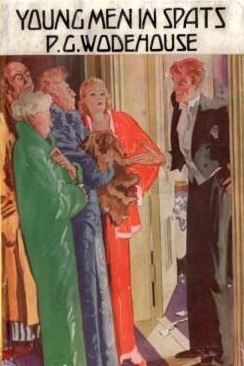
Young Men in Spats is a collection of short stories by P. G. Wodehouse, first published in the United Kingdom on 3 April 1936 by Herbert Jenkins, London, then in the United States with a slightly different selection of stories on 24 July 1936 by Doubleday, Doran, New York.

The Old Reliable is a novel by P. G. Wodehouse, first published in the United Kingdom on 18 April 1951 by Herbert Jenkins, London and in the United States on 11 October 1951 by Doubleday & Co, New York. The novel was serialised in Collier's magazine from 24 June to 22 July 1950, under the title Phipps to the Rescue.
"Lord Emsworth Acts for the Best" is a short story by P. G. Wodehouse, which first appeared in the United Kingdom in the June 1926 Strand Magazine, and in the United States in the 5 June 1926 issue of Liberty. Part of the Blandings Castle canon, it features the absent-minded peer Lord Emsworth, and was included in the collection Blandings Castle and Elsewhere (1935), although the story takes place sometime between the events of Leave it to Psmith (1923) and Summer Lightning (1929).
Plum Stones is a set of 12 volumes of uncollected short stories by P. G. Wodehouse. All 25 stories were previously published in magazines, but not published in book form in the UK. The volumes were published posthumously between 1993 and 1995 in the UK by Galahad Books. The first two volumes were published in 1993, the following six in 1994, and last four in 1995.
"Jeeves and the Yule-tide Spirit" is a short story by P. G. Wodehouse, and features the young gentleman Bertie Wooster and his valet Jeeves. The story was published in The Strand Magazine in the United Kingdom in December 1927, and in Liberty in the United States that same month. The story was also included as the third story in the 1930 collection Very Good, Jeeves.

The Tenderfoot is a 1932 American Pre-Code comedy western film directed by Ray Enright and written by Earl Baldwin, Monty Banks and Arthur Caesar. The film stars Joe E. Brown and Ginger Rogers. The film was released by Warner Bros. on May 23, 1932. It is based on Richard Carle's 1903 play The Tenderfoot, and George S. Kaufman's 1925 play The Butter and Egg Man.
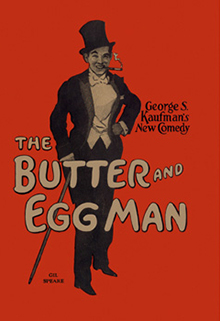
The Butter and Egg Man is a 1925 play by George S. Kaufman, the only play he wrote without collaborating. It was a Broadway hit during the 1925–26 season at the Longacre Theatre. Adapted to film six times, it is still performed on stages today.
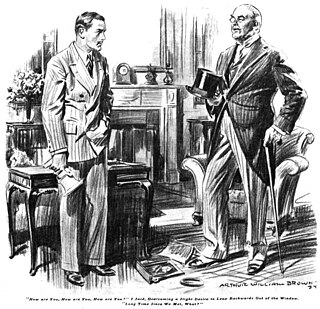
"The Rummy Affair of Old Biffy" is a short story by P. G. Wodehouse, and features the young gentleman Bertie Wooster and his valet Jeeves. The story was published in the Saturday Evening Post in the United States in September 1924, and in The Strand Magazine in the United Kingdom in October 1924. The story was also included in the 1925 collection Carry On, Jeeves.

















